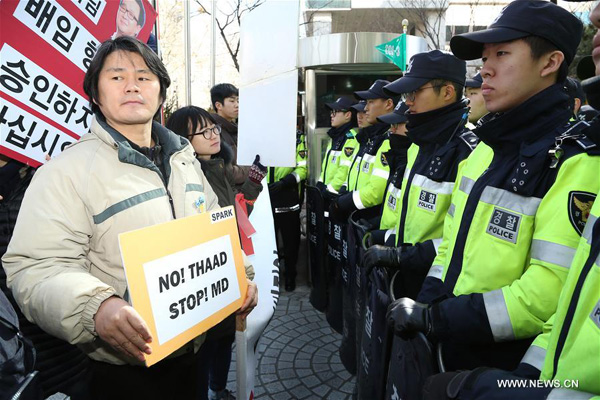Signs ROK and China can turn the page on THAAD

 |
| People protest against the deployment of an advanced US missile defense system in front of the Lotte Headquarters in Seoul, South Korea, Feb 27, 2017. [Photo/Xinhua] |
Republic of Korea Foreign Minister Kang Kyungwha reportedly told lawmakers on Monday that the country is not considering any additional deployment of the Terminal High Altitude Area Defense anti-missile system. She also reiterated that the ROK will not be part of the US-led missile defense networks.
Such remarks are valuable because they suggest Seoul has heeded Beijing's security concerns and is taking steps to get their strained relations back on track.
Kang's remarks follow other signs of a thaw in bilateral relations. On Tuesday the ROK's chief representative in the Six-Party Talks will meet his Chinese counterpart in Beijing, one week after the first talks in nearly two years were held between the two countries' defense chiefs at a security forum in the Philippines.
A meeting has also reportedly been slated between Chinese President Xi Jinping and his ROK counterpart Moon Jae-in on the sidelines of the Asia-Pacific Economic Cooperation meeting to be held in Vietnam on Nov 10-11.
China has always opposed the deployment of THAAD in the ROK as part of the missile defense networks the US is trying to establish because its powerful radar can probe deep into the country and harm its national security. Yet it has never wavered in seeking to resolve the diplomatic dispute by maintaining close communications and exchanges with the ROK. Beijing understands the ROK's security concerns regarding the latest development on the Korean Peninsula.
That China and the ROK are pursuing ways to improve their relations reflects the fact that their common interests outweigh their differences and that the two neighbors share the desire to turn the page.
This is timely since the growing tensions between Pyongyang and Washington threaten to become more than just a war of words. At such a critical time, Beijing and Seoul can work together to be a voice of reason. For with the escalating war rhetoric from Pyongyang and Washington, Beijing and Seoul stand in the same trench calling for the same thing: the maintaining of regional peace and stability.
The rapport they seem to have regained is testament to the resilience of their relations, which have brought real benefits to the people of both countries since the establishment of diplomatic ties 25 years ago. China hopes the ROK will fulfill the commitments it has made. Both sides should treasure and strengthen this hard-won strategic and cooperative partnership.


































